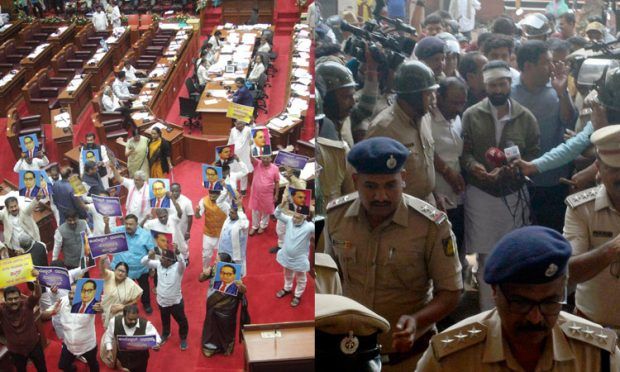Bengaluru: A verbal altercation between Minister Laxmi Hebbalkar and BJP leader CT Ravi in the Legislative Council has escalated to the Raj Bhavan. Governor Thaawarchand Gehlot has sought details of the incident from Council Chairman Basavaraj Horatti.
Following the Governor’s directive, Raj Bhavan officials contacted Horatti to seek clarification about the events that unfolded during the winter session at Suvarna Soudha in Belagavi, held from December 9 to 19.
Chairman’s Explanation:
According to Horatti, the disagreement stemmed from remarks made about Dr. B.R. Ambedkar in a statement by Union Home Minister Amit Shah. The session had to be adjourned amidst the commotion. Subsequently, members from both the ruling and opposition parties lodged complaints against each other.
While ruling party members accused CT Ravi of using derogatory language, the opposition alleged that Minister Laxmi Hebbalkar made inflammatory remarks.
Horatti stated that after reviewing both complaints, he decided to adjourn the session indefinitely, leaving the matter to the conscience of the members. The details were conveyed to Raj Bhavan over a phone call.
He also informed Chief Minister Siddaramaiah about the Governor’s inquiry before providing an explanation.
Legal Experts Weigh In:

Bengaluru: Senior legal experts have clarified that the police cannot intervene in matters within the legislature without explicit permission, as members are constitutionally protected for their speech and voting within the house.
Chairman’s Decision is Final:
Senior advocate Ashok Haranahalli emphasized that the Speaker or Chairman has the ultimate authority over incidents within the legislature. The members’ speech and conduct inside the house are protected under constitutional privileges. Haranahalli explained that allowing the police to investigate or conduct spot inspections inside the legislature would undermine the authority of the Speaker or Chairman.
Citing the case where Lakshmi Hebbalkar reportedly called Ravi a “murderer” in retaliation, Haranahalli noted that this could lead to a chain of legal disputes, including defamation cases. Any such investigation would require the Speaker’s explicit consent, he said.
High Court Permission Required:
Senior advocate K.V. Dhananjaya stated that while the legislature provides immunity to its members for their actions and statements during proceedings, the police or complainants could approach the High Court for directions. However, the police cannot bypass the Speaker’s authority to access the legislature.
Dhananjaya explained that even if discussions or arguments continue after a session is adjourned, the constitutional protection still applies. If the police intend to proceed with the case, they must seek High Court approval. Similarly, complainants must approach the judiciary rather than attempting to circumvent legislative immunity.
Experts concluded that the legislature’s sanctity is protected by the Constitution, and any deviation from this principle would weaken the powers of the Speaker or Chairman.